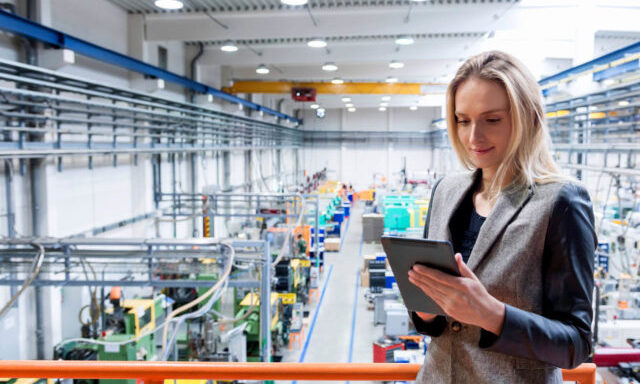Technology & innovation
Chemical manufacturing challenges in a post-coronavirus future

How should chemical manufacturers do business in a post-coronavirus world? With the challenges ahead, where does sustainability and green chemistry fit in?
Products made by chemical manufacturers are often part of the supply chain upstream of other industries, such as food, medical, construction, transport, electronics, and clothing. It contributes to many of the consumer products we use at home, such as cleaning products. The types of businesses involved are also extremely varied – industrial intermediates, products, polymers, dyes and medicines, for example.
Like many industries, coronavirus has hit chemical manufacturing hard, not only due to shutdowns but also because of moves to restrict the activities of people and consumers. World trade has plummeted, while oil prices have fallen, which has wiped out the advantage that powered US chemical exports had over other countries.
Coronavirus has hit chemical manufacturing supply chains particularly hard. China, the world’s second-largest economy, was hit first, causing shocks to global supply chains that relied on chemicals coming from the country. In pharmaceuticals, for instance, many active pharmaceutical ingredients and medicines are sourced in China.
Even before coronavirus hit, global supply chains were being hit by the trade war between the US and China, which forced US companies to restructure their supply chains so that they were not so reliant on China.
Chemical manufacturing relies on long distributed supply chains. The coronavirus pandemic created a real bottleneck in the availability of the chemicals from China, which quickly caused trouble for supply chains around the world.
The removal of China from supply chains meant chemical manufacturers had to act fast in adapting supply chains to find alternative suppliers – which in the case of medicines in the pharmaceutical sector, could have been problematic from the view of global health.
In a post-coronavirus world, it may pay to invest in industry 4.0 technology
The external shock caused by coronavirus to chemical manufacturers brings a unique dynamic that could be the push you need to innovative. Often, recession forces organizations to innovate new business models. It may be time to look at digital transformation and technology in the form of industry 4.0 to improve the state of your supply chains.
Post-coronavirus, your business will need to be competitive and achieve more with less. If you’re not on a path already, you need to think deeply about what your business can gain from digital transformation.
For example, digital transformation can support supply chain reliability and efficiency. It encourages the adoption of systems that save you money due to being easy to integrate, operate and audit, increasing their levels of availability, production, efficiency and quality.
You may need to look at systems that can plan, forecast and handle inventory, alongside financial information related to the supply chain. You will require platforms that can help make impactful decisions, making complex processes such as expansion into new markets less complicated. And with the systems in place to control your data, you can look at leveraging emerging technologies such as artificial intelligence, automation and machine learning,
As a chemical manufacturer, your business might want to look at technology in a post-coronavirus world which can help you with:
- Demand planning – Capabilities can forecast the demand for chemicals so you can deliver them in an efficient way to customers. You can use analytics to examine information such as sales data and customer orders to make smart decisions about inventory and production levels.
- Real-time decision making – Supported by data provided through the Internet of Things (IoT) with connected devices, you can use combine historical and real-time sensor data for analysis. Combine this data with machine learning algorithms, and you can create predictive models and patterns which pinpoint the likely point of failure.
- Sourcing – When it comes to supply, you will want the right technology that can help you analyze what you buy, from whom, at what price, and at what volume. With costs soaring, you will need to get the most for your money at the same time as your demands. Having technology in place can help you find reliable, affordable, and quality suppliers, that can find a balance between the quality of materials and affordability.
- Production – Technology can help you efficiently plan, develop, manufacture and deliver goods or services. The right systems can help you gain the insights into your production processes you need to make smart business decisions
- Inventory management – Chemical manufacturers can keep a detailed real-time record of the products they hold, containing information used in sales, purchasing, warehousing and production, allowing complete quality control.
- Logistics – The right systems can help you efficiently move products, assisting you with packaging, transportation, distribution and delivery through multiple channels.
Big data and artificial intelligence
Like every other industry, chemical manufacturers generate a lot of data which allows them to gain better insight into the business and improve the efficiency of their operations. You can collect data through computer and manufacturing systems, as well as IoT sensors on the factory floor.
You can also use IoT technology to maintain equipment, which can continually update the status of machinery in real-time and provide notifications if components are likely to fail. IoT device data can help optimize performance and reduce waste.
Research and development and quality control teams could sift through data at every stage of the manufacturing process – from getting the raw materials in at the start to the end where the product is packaged up and distributed. Through this manufacturing lifecycle, you can end up storing a massive amount of useful data, which technology can manage in a practical, efficient and effective way.
Today we have computing technology, interconnected systems, automation and artificial intelligence (AI) which can analyze massive amounts of environmental and IoT-generated factory data. All this allows you to build optimized and integrated end-to-end manufacturing processes, allowing you to create better products and get quality chemicals into the market faster.
Traceability
Systems that can effectively track and trace chemicals through the supply chain provides valuable data to improve business and operation processes. Flexible and responsive systems that can create quality chemical products while maintaining control and integrity. Track and trace can support inventory management and accurate stock-taking, and support IoT real-time information on vital information such as locations, storage conditions (such as temperature) and expiration dates.
Serialization can link a product, wherever it is in the world, to its origin, batch number and expiration dates. You can track chemicals wherever they are in the supply chain, from raw materials to the distributor you are supplying. New technologies like blockchain and IoT could also herald superior levels of visibility, traceability and reliability.
How you can create a sustainable business strategy
The public now expects chemical manufacturers to ensure that the chemicals they create and use in the processes are environmentally friendly. If you’re involved in chemical manufacturing, you may have already encountered regulatory and legislative pressure, or at least feel pressured to raise awareness.
Chemical manufacturing is globally essential to trade – and this is why industrial sustainability is more important than ever. For the last few years, in particular, there has undoubtedly been a perception that chemicals are a significant cause of environmental degradation – whether you’re thinking of pollution caused by chemical products or processes or the risk caused by hazardous chemicals.
In a post-coronavirus world, it may well pay off to invest in processes that minimize negative environmental impacts, conserves energy and natural employees, making conditions safe for employees. In creating sustainable products, you can also meet legislative and business aims, help your reputation, increase profit and attract investment.
Industry 4.0 technologies can undoubtedly support your sustainability aims. For example, they could help support:
- A more flexible and agile supply chain allowing you to use alternatives to conventional fossil driven raw materials. You could take advantage of sustainable but economically viable and cost-effective options like biomass.
- Smarter and more efficient production processes. With technologies, methods and new business models, you can make your operations more sustainable. You could have more flexible production processes, allowing you to create a more diverse range of products and adapt more quickly to changing market demands and conditions.
- The improvement in quality and functionality of chemical products, allowing you to respond better to trends in the supply chain in a way which is safe and secure.
It’s not just big business that can benefit. Start-ups, small and medium-sized can be extremely competitive through not having to rely on traditional ways of working, evolving and innovating to beat the competition that may nervously hold back on investment.





